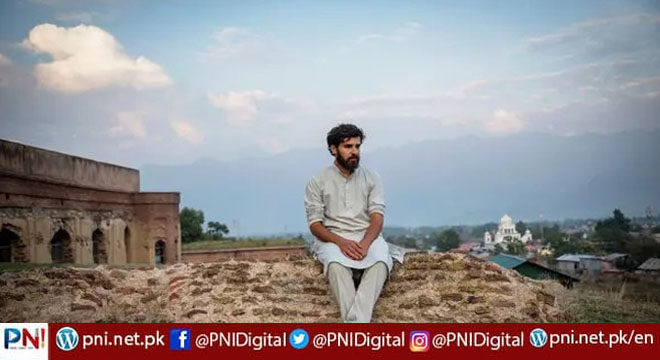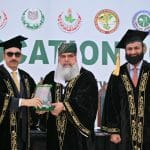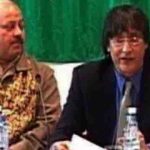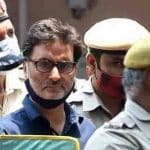NEW YORK, Sep 07 (APP):India’s brutal repression in Kashmir has risen to a level that even the disputed state’s poets have been “muzzled”, according to a report in The New York Times.
In interviews with the newspaper more than a dozen Kashmiri poets said that “increased surveillance has left them with no choice but to stop writing resistance poetry or forced them to read it in places far from the gazing eyes of the agents of the state”.
“Indian forces now keep the largely Muslim region under a tight grip,” the Times correspondent, Sameer Yasir, wrote from Balhama in Indian occupied Kashmir, recalling that New Delhi had poured additional soldiers two years ago as it stripped the region of about eight million people of its semiautonomy.
Citing the case of Ghulam Mohammad Bhat, who writes under the pen name Madhosh Balhami, the report said he now reads and composes poetry in secret as the Indian authorities step up its crack down on dissent.
During the mid-1990s peak of the insurgency in Kashmir, it said, Bhat sang eulogies for militants at their funerals.
“For that, the local government dragged him to detention centers, where he wrote poetry and read it to fellow detainees after they were hung by their wrists and forced to stare at high-voltage lamps,” correspondent Yasir wrote.
“In the last 30 years I have never seen this kind of suppression,” Bhat was quoted as saying in the report. “There is silence everywhere, as if the silence is the best cure for our present crisis.”
“And in cracking down on free expression,” the report added, “the authorities have muzzled the region’s poets, practitioners of a centuries-long tradition.
Three Kashmiri poets told The New York Times that they were questioned recently for hours by police officers for speaking to journalists.
“We are not allowed to breathe until and unless we breathe as per the rules and the wishes of the government,” Zabirah, a female Kashmiri poet was quoted as saying. “The silencing of voices, the freedom to speak and vent grievances, all is gone, and it is suffocating.”
“Ms. Zabirah now takes inspiration from Kashmir’s military checkpoints, bristling with soldiers and endless roadblocks,” correspondent Yasir said, and reproduced her poem denouncing the oppressive measures.
Meanwhile, the report cites Nirmal Singh, a top leader of India’s ruling Bharatiya Janata Party and former deputy chief minister of Jammu and Kashmir, as saying that officials want to curb the separatist activities.
“Be it poets or anyone else, questioning India’s territorial integrity will not be allowed. If you speak about azadi or Pakistan, that will not be allowed,” Singh warned.
The report said journalists are told what to write, and some have been barred from flying out of the country, adding that the police have threatened to slap antiterrorism charges on reporters who tweet about conditions there.
“Since 2019, more than 2,300 people have been jailed under stringent sedition and antiterrorism laws, which criminalized such activities as raising slogans or posting political messages on social media, correspondent Yasir wrote, citing one Indian media outlet.
The Times report said, “Even peaceful protests are quickly stopped by police. On Aug. 5, the second anniversary of India’s crackdown, many Kashmiri shopkeepers locked their doors in protest. Then in Srinagar, Kashmir’s summer capital, plainclothes men armed with long iron rods and blades began cutting the locks on the doors and gates of shuttered shops, forcing owners to return.
“The police appeared with the men cutting the locks and did nothing to stop them. When asked by a reporter why the police were there, one officer said they were protecting shopkeepers. Another shooed journalists away.
“Kashmir has long stood as a crossroads between the Hindu and Muslim worlds. Its poetry reflects that rich history and celebrates the land’s ivory-tipped mountaintops, crystalline lakes and dazzling wildflower fields….”
The militants sought full independence from India, sparking years of violence, it was pointed out. “Though the fighting eventually ebbed, separatists have lingered in the region for years and enjoyed support among large parts of the population,” correspondent Yasir highlighted.
“Then a suicide bombing killed more than 40 Indian soldiers and a subsequent military clash between Indian and Pakistan erupted near their disputed Kashmir border, leading to New Delhi’s crackdown in the summer of 2019,” the report said, adding that the grave developments moved Kashmiri poet Zeeshan Jaipuri to compose a poem voicing concern over the prevailing grim situation. He read his verses to his friends inside the ruins of a fort overlooking Srinagar.
Jaipuri, grandson of a famous Kashmiri poet, grew embittered in 2010, when a tear-gas canister killed his 17-year-old neighbour, according to the Times report. He grew to hate his school textbooks, which portrayed Kashmir as a happy tourist place.
Still, he said, in past years artists and poets did not need to struggle so hard to find places to express themselves.
“Now we read our poetry to ourselves, or to a few close friends,” Jaipuri said. “Our throats are pressed because the government doesn’t want us to breathe in fresh air,” he said.
On Aug. 5, the second anniversary of India’s crackdown, many Kashmiri shopkeepers locked their doors in protest, the report said.
Conflict, too, had touched Bhat, the poet who writes as Madhosh Balhami. In early 2018, according to the report, militants pushed their way into his family home.
“Indian soldiers arrived to battle them. He lost his house and more than a thousand pages of poetry. Watching the flames, he said later, felt like watching his own body burn….
“Today he keeps his poems largely to himself. Over the past two years, the police had summoned him several times and told him he was trying to sow discord.
In these times, he said, silence is golden.
“Fingers are not trembling, but the brain says no,” Bhat said as he sat on the bank of the river, wary of the sight of others. “India has largely prevailed to choke our voices, but the cry of freedom inside our hearts will remain. It will not die.”
Follow the PNI Facebook page for the latest news and updates.








